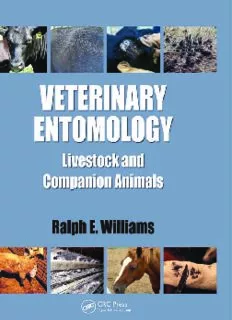
Veterinary Entomology: Livestock and Companion Animals PDF
Preview Veterinary Entomology: Livestock and Companion Animals
VETERINARY ENTOMOLOGY Livestock and Companion Animals This page intentionally left blank VETERINARY ENTOMOLOGY Livestock and Companion Animals Ralph E. Williams Purdue University West Lafayette, Indiana, U.S.A. CRC Press Taylor & Francis Group 6000 Broken Sound Parkway NW, Suite 300 Boca Raton, FL 33487-2742 © 2010 by Taylor and Francis Group, LLC CRC Press is an imprint of Taylor & Francis Group, an Informa business No claim to original U.S. Government works Printed in the United States of America on acid-free paper 10 9 8 7 6 5 4 3 2 1 International Standard Book Number: 978-1-4200-6849-8 (Hardback) This book contains information obtained from authentic and highly regarded sources. Reasonable efforts have been made to publish reliable data and information, but the author and publisher cannot assume responsibility for the validity of all materials or the consequences of their use. The authors and publishers have attempted to trace the copyright holders of all material reproduced in this publication and apologize to copyright holders if permission to publish in this form has not been obtained. If any copyright material has not been acknowledged please write and let us know so we may rectify in any future reprint. Except as permitted under U.S. Copyright Law, no part of this book may be reprinted, reproduced, transmit- ted, or utilized in any form by any electronic, mechanical, or other means, now known or hereafter invented, including photocopying, microfilming, and recording, or in any information storage or retrieval system, without written permission from the publishers. For permission to photocopy or use material electronically from this work, please access www.copyright. com (http://www.copyright.com/) or contact the Copyright Clearance Center, Inc. (CCC), 222 Rosewood Drive, Danvers, MA 01923, 978-750-8400. CCC is a not-for-profit organization that provides licenses and registration for a variety of users. For organizations that have been granted a photocopy license by the CCC, a separate system of payment has been arranged. Trademark Notice: Product or corporate names may be trademarks or registered trademarks, and are used only for identification and explanation without intent to infringe. Library of Congress Cataloging‑in‑Publication Data Williams, Ralph E. (Ralph Edward), 1949- Veterinary entomology : livestock and companion animals / Ralph E. Williams. p. cm. Includes bibliographical references and index. ISBN 978-1-4200-6849-8 (hardcover : alk. paper) 1. Veterinary entomology. 2. Insect pests--Control. 3. Livestock--Parasites. 4. Domestic animals--Parasites. I. Title. SF810.A3W556 2009 636.089’6968--dc22 2009039059 Visit the Taylor & Francis Web site at http://www.taylorandfrancis.com and the CRC Press Web site at http://www.crcpress.com DeDication I dedicate this book to my wife Jeanine and children Jason, Sarah, Amy, Nicholas, and Clayton, and to the loving memory of my son John. I also dedicate this book in the memory of Dr. R. C. Dobson who inspired me to pursue a career in veterinary entomology, and to Dr. E. C. Turner, Jr. and Dr. Jakie A. Hair, who provided me the opportunity to fulfill my goal in this field. In addition, I dedicate this book to Dr. Fred Knapp and Dr. Jack Campbell, who have been role models, mentors, and colleagues from whom I have learned much throughout my career in veterinary entomology. This page intentionally left blank contents Dedication .............................................................................................................v List of Illustrations ...............................................................................................ix Preface ...............................................................................................................xvii Acnowledgments ...............................................................................................xix Introduction .......................................................................................................xxi The Author .....................................................................................................xxvii Chapter 1 Importance of Arthropods ...................................................................................1 Chapter 2 Principles of Arthropod Management ...............................................................11 Chapter 3 Flies (Diptera) .....................................................................................................33 Chapter 4 Myiasis.................................................................................................................71 Chapter 5 Lice (Order Phthiraptera) ...................................................................................91 Chapter 6 Fleas (Order Siphonaptera) ..............................................................................119 Chapter 7 Mites ..................................................................................................................133 Chapter 8 Ticks ..................................................................................................................165 Chapter 9 Other Arthropod Groups of Veterinary Importance ......................................193 vii Contents Chapter 10 Management of Cattle Pests (Range, Confinement, Dairy) ............................213 Chapter 11 Management of Swine Pests ............................................................................243 Chapter 12 Management of Sheep and Goat Pests ............................................................253 Chapter 13 Management of Poultry Pests ..........................................................................265 Chapter 14 Management of Equine Pests ...........................................................................289 Chapter 15 Management of Pet Pests .................................................................................305 Selected References for Further Reading ........................................................321 Index .................................................................................................................333 viii List of iLLustrations Figure 1.1 Economic injury level (EIL) and economic threshold level (ETL) over time and pest population density .....................................................8 Figure 1.2 Bos indicus and B. taurus cattle tick breed resistance research .................................................................................................................9 Figure 2.1 Removing manure in an egglayer house pit ..............................14 Figure 2.2 Cow pasture .................................................................................15 Figure 2.3 Feedlot design ..............................................................................16 Figure 2.4 Electrical fly zapper .....................................................................16 Figure 2.5 Pteromalid wasp ..........................................................................18 Figure 2.6 Carcinops pumilio beetle ............................................................18 Figure 2.7 Spraying cattle with insecticide ..................................................22 Figure 2.8 Cattle dip vat ................................................................................24 Figure 2.9 Installing cattle insecticide-impregnated ear tags ......................25 Figure 2.10 Cattle insecticide dust bag ........................................................25 Figure 2.11 Cattle insecticide backrubber ...................................................26 Figure 2.12 Systemic insecticide spot-on treatment ....................................27 Figure 2.13 Cattle feed-additive treatment ...................................................27 Figure 2.14 Cattle insecticide bolus .............................................................28 Figure 2.15 Insecticide backpack sprayer ....................................................29 Figure 2.16 Truck-mounted ULV (ultra-low-volume) insecticide sprayer .................................................................................................................29 ix
Description: